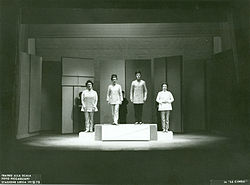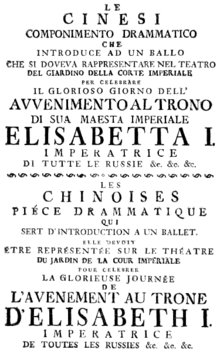Le cinesi (Gluck)
| Work data | |
|---|---|
| Title: | The Chinese women |
| Original title: | Le cinesi |

Performance at Piccola Scala, Milan 1973 |
|
| Shape: | Azione teatrale in one act |
| Original language: | Italian |
| Music: | Christoph Willibald Gluck |
| Libretto : | Pietro Metastasio |
| Premiere: | September 24, 1754 |
| Place of premiere: | Hof Castle |
| Place and time of the action: | In a Chinese city, Lisinga apartments |
| people | |
|
|

Le cinesi , in German the Chinese women , is an Azione teatrale in one act by Christoph Willibald Gluck . The Italian libretto comes from the Viennese court poet Pietro Metastasio . Gluck wrote this opera on the occasion of Maria Theresa's invitation by the Prince of Saxony-Hildburghausen to his Schloss Hof estate , where a festival lasting several days was celebrated. The first performance took place there on September 24, 1754. It is a playful aesthetic discussion in the guise of a chinoiserie , which compares the tragedy, the pastoral and the comic opera.
action
Lisinga, Sivene and Tangia spend the afternoon together in Lisinga's chambers, bored, without thinking of anything interesting to do. ("E ben: stupide e mute par che siam diva! ...")
But then Silango, Lisinga's brother, who has just returned from Europe, enters the girls' room and breaks a Chinese ban. ("Dirò, Ninfe, anchor io il parer mio, se non vi son malesto ...")
Although the friends ask him to leave, Silango, who is in love with Sivene, hesitates. When the girls make sure that no one has seen Silango when they walk in, Lisinga decides that he has to stay until dark to avoid detection. ("È miglior consiglio differir, che tu parta, infin che affatto s'oscuri il ciel.")
At Silango's suggestion, they want to pass the time until evening with theater plays. But everyone wants to play a different piece:
Lisinga chooses the Greek tragedy and plays Andromache with her son. ("Questa d'Epiro è la real città. D'Ettore io sono la vedova fedele.")
Sivene and Silango, as shepherdess Licoris and shepherd Tirsis, perform a pastoral. ("Qui al consiglio d'un fonte il crin s'infiora Licori pastorella semplice, quanto bella. Ha Tirsi al fianco ...")
Tangia annoyed notices that Silango is in love with Sivene (“Quel titolo di bella è assai frequente!”) And indirectly makes fun of Silango, who recently returned from Europe, in the comedy she has chosen. ("Il vago Tirsi accomodar vogl'io!")
Thereupon again disagreement flares up about who played best. Finally, Silango tries to mediate and suggests dancing, since in ballet there would be no crying, no yawning and no offense. ("Concertate un balletto! Ognunne gode, ognuno se ne intende; non fa pianger, non secca e non offende.")
The piece closes with a joint dance by the four. ("Voli il piede in lieti giri! ...")
libretto
The libretto of the same name by Pietro Metastasio was first performed in Vienna during the carnival season of 1735 in a setting by Antonio Caldara .
reception
After the Vienna premiere in 1754, the work was given in 1761 at the Teatro del Giardino della Corte in Saint Petersburg .
There have been several performances and CD releases in recent times:
- 1963: Concert performance in Rome. Orchestra della RAI di Roma, conductor: Luciano Bettarini . Singers: Genia Las (Lisinga), Renata Mattioli (Sivene), Rosina Cavicchioli (Tangia), Renato Ercolani (Silango).
- 1973: Performance at Scala Milan (Piccola Scala). Management: Giampiero Taverna . Singers: Biancamaria Casoni (Lisinga), Carmen Lavani (Sivene), Lucia Valentini Terrani (Tangia), Carlo Gaifa (Silango).
- 1983/1989/1995: CD. Munich Radio Orchestra, conductor: Lamberto Gardelli . Singers: Alexandrina Milcheva-Nonova (Lisinga), Kaaren Erickson (Sivene), Marga Schiml (Tangia), Thomas Moser (Silango).
- 1985/1990: CD. Schola Cantorum Basiliensis , director: René Jacobs . Singers: Anne Sofie von Otter (Lisinga), Isabelle Poulenard (Sivene), Gloria Banditelli (Tangia), Guy de Mey (Silango).
- 1987: Video recording from Schwetzingen. Concerto Köln , director: René Jacobs, staging: Herbert Wernicke . Singers: Christina Högman (Lisinga), Sophie Boulin (Sivene), Eva Maria Tersson (Tangia), Kurt Streit (Silango).
- 2014: Performance in the garden of the St. Lorenz Church in Berching . Opera Incognita, director: Ernst Bartmann , staging: Andreas Wiedermann . Singers: Yeonjin Choi (Lisinga), Namyoung Kim (Sivene), Minjung Yoon (Tangia), Sangkyu Lee (Silango).
- 2014: Performance in Schloss Hof . Cappella Istropolitana, direction: Gerhard Lessky . Singers: Elsa Giannoulidou (Lisinga), Marelize Gerber (Sivene), Anna Manske (Tangia), Gernot Heinrich (Silango).
In 2010 the composer Karsten Gundermann edited the work and added intermezzi in the style of the Beijing opera of the 18th century. This version was performed at the Potsdam Sanssouci Music Festival and in Beijing with the Ensemble L'Arte del mondo and the China National Peking Opera Company under the direction of Werner Ehrhardt .
Web links
- Le Cinesi : Sheet Music and Audio Files in the International Music Score Library Project
- Libretto (Italian / French) of the opera by Christoph Willibald Gluck, Saint Petersburg 1761. Digitized in the Corago information system of the University of Bologna
- Le cinesi (Christoph Willibald Gluck) in the Corago information system of the University of Bologna
- Entry in the digital Gluck catalog raisonné
Individual evidence
- ↑ a b c d Christoph Willibald Gluck. In: Andreas Ommer: Directory of all complete opera recordings, Zeno.org , Volume 20, pp. 5485 ff.
- ^ Contrasti ad "Amore e Psiche". Corriere della Sera , March 1973.
- ^ Christoph Willibald Gluck: Le Cinesi - Lamberto Gardelli. CD information from Allmusic , accessed March 1, 2015.
- ^ Christoph Willibald Gluck: Le Cinesi - René Jacobs, Isabelle Poulenard. CD information from Allmusic , accessed March 1, 2015.
- ↑ Thomas Molke: Le Cinesi - the winner is the dance. Review in Online Musik Magazin, accessed on March 1, 2015.
- ↑ Le Cinesi in Schlosshof ( memento of April 2, 2015 in the Internet Archive ) on the website of the International Gluck Society, accessed on March 1, 2015.
- ↑ Website for the performance of Karsten Gundermann's adaptation of the opera ( memento of October 11, 2015 in the Internet Archive ), accessed on March 1, 2015.
